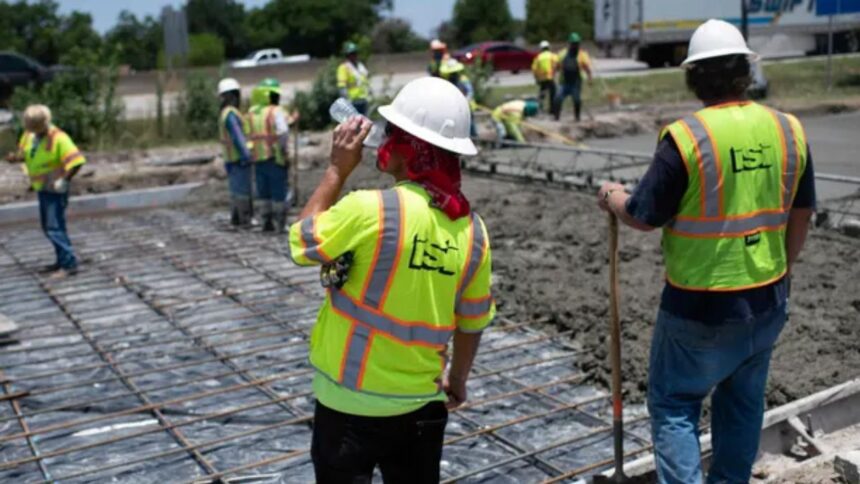In a controversial move, Florida Governor Ron DeSantis signed a bill on Thursday that prohibits cities and counties from implementing heat safety measures for outdoor workers, joining Texas as the only state to enact such bans.
The legislation, House Bill 433, comes as Florida experiences increasingly extreme heat conditions, raising concerns among labor advocates and health experts about the well-being of the state’s nearly 2 million outdoor workers.
Blocking Local Efforts to Protect Workers
The new law effectively nullifies Miami-Dade County’s proposed ordinance that would have required employers to provide outdoor workers with access to water, shade, and paid rest breaks on days when the heat index reaches 90 degrees or higher.
The county, home to an estimated 300,000 outdoor workers, had been considering the measure in response to record-breaking temperatures and heat-related fatalities among workers.
Esteban Wood, director of the advocacy group We Count! Expressed his disappointment with the legislation, stating,
This is a significant loss for not only the campaign but for all the families that have for many years been fighting for shade, and rest, and the right to return home after work alive.
Preempting Local Authority
Governor DeSantis downplayed his role in the bill’s passage, asserting that the concern originated from Miami-Dade County officials and not from his office.
However, critics argue that the law undermines worker protection and local government’s ability to address the unique needs of their communities.
Democratic state Senator Victor Torres denounced the law as an attack on workers, while Senator Tina Polsky questioned the necessity of a statewide ban, stating,
If you have a different regulation in Miami than in Orlando, I think a large construction company can figure that out. They have to deal with that anyway. All the permitting processes are different. They deal with different local regulations everywhere.
Disproportionate Impact on Vulnerable Workers
The ban on local heat protections is expected to disproportionately affect workers of color and immigrant workers, who make up a significant portion of Florida’s agricultural and construction workforce.
These workers often face additional challenges, such as language barriers and fear of retaliation, that can prevent them from advocating for their safety.
Lupe Gonzalo, a former tomato picker in Florida, recalled the debilitating effects of heat on her and her colleagues, stating,
“Sin agua, sin descansos,“ which translates to “without water, without rest.“
Waiting for Federal Action
As Florida and Texas move to restrict local heat protections, advocates are turning their attention to the federal government for action. The Occupational Safety and Health Administration (OSHA) is currently developing national heat standards for workers, but the process is expected to take years.
In the meantime, workers in states without heat protections are left vulnerable to the increasing frequency and intensity of extreme heat events.
According to a Union of Concerned Scientists analysis, if no action is taken on climate change, tens of millions of outdoor workers in the US could risk losing a collective $55.4 billion in earnings each year by midcentury due to extreme heat.
The Need for Comprehensive Protection
Labor advocates and health experts stress the importance of comprehensive heat protections for outdoor workers, including access to water, shade, rest breaks, and training on recognizing and responding to heat-related illnesses.
They argue that these measures not only save lives but also benefit employers by reducing lost work days and improving overall productivity.
As Juanita Constable, a senior climate and health advocate at the Natural Resources Defense Council, noted,
The burden of proof for showing a violation of that clause [OSHA’s general duty clause] is extremely high. And fines are often too low to dissuade that behavior, especially when employers can negotiate down.
Looking Ahead
With record-breaking temperatures becoming the norm, the debate about overheating protections for outdoor workers is likely to intensify in the coming years.
As federal efforts to establish national standards progress slowly, workers in states like Florida and Texas will continue to face the dangerous consequences of inadequate protections.
Oscar Londoño, co-executive director of WeCount!, encapsulated the urgency of the situation, stating,
If these politicians already recognize the crisis of extreme heat for student-athletes, why don’t they care as much about the outdoor workers who grow their food and build their cities?
As the climate crisis worsens and extreme heat events become more frequent and severe, policymakers and employers must prioritize the health and safety of outdoor workers, ensuring that no one has to choose between their life and their livelihood.
Check Also: Endangered Kemp’s Ridley Sea Turtle Nesting Season Kicks Off at Padre Island





